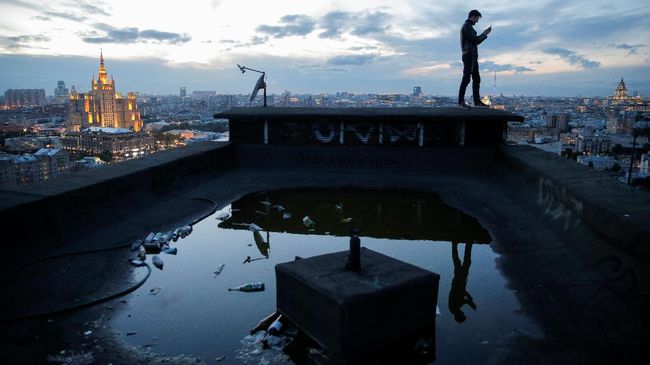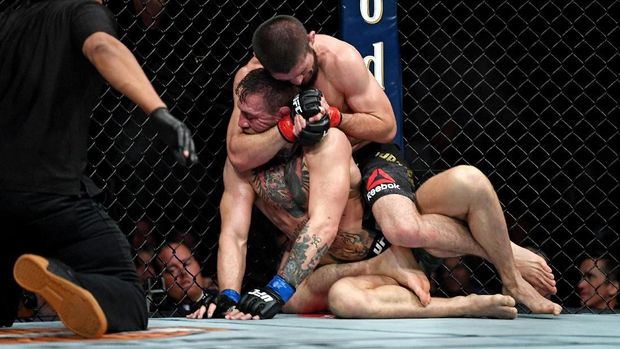Alhamdulillah Kisah Khabib dengan izin Allah jadi kunci dapat tahu dan mencari tahu tentang Imam Shamil. Aamiin.

Motivasi Pagi....
“Agama Adalah Nombor 1, Bukan Sukan”, Khabib Pernah Tolak Tawaran Lumayan Kerana Mahu Tumpu Ibadah Di Bulan Ramadan,Ronaldo orang yang kuat Supporter Khabib.
Patut-lah Khabib Nurmagomedov ni lantang memperjuangkan agama islam daripada dihina orang dan berani melompat keluar di tempat yang ramai musuhnya seorang diri, Rupanya beliau berketurunan dari seorang Pejuang dan Ketua Imam serta Mujahideen yang terbilang iaitu Imam Syamil al Dhagestani dari Tarekat Naqshbandiyah.
Imam Syamil Rahimahullah Ta'ala adalah seorang ulama sufi dan Lagenda Dagestan-Kaukasus. Seorang mujahid, Pemimpin Pasukan Gerila Dagestan melawan Kekasaran Rusia pada perang awal 1820-an. Dalam Tarekat Naqsyabandiyah di Kaukasus beliau adalah Khalifahnya (Pimpinan Tarekat) ketika zamannya.
Imam Syamil adalah pejuang dan ulama Sufi dari Naqsyabandiyah terkemuka di Kaukasus, sempat mendapat gelar Amirul Mukminin saat memimpin Keimaman Kaukasus (Imarah Kaukasus) ke-3, yang semasa dengan Kekhilafahan Turki Usmani (Ottoman). Beliau juga digelari "Salahudin Kaukasus."
Mengenai isu Khabib menyerang , dia dah buat permohonan maaf selepas kemenangannya , Dia meminta maaf kepada semua pihak kerana hilang kawalan emosi , Dia kata dia juga seorang manusia biasa , beliau bertindak sedemikian kerana tidak Tahan , Agamanya , Ayahnya , Negaranya , Jurulatihnya terus dihina oleh Conor McGregor dan teamnya , dari sebelum perlawanan sehinggalah selepas perlawanan. Yang dia serang tu bukan penonton awam tapi team conor mcgeror. Dia tidka kisah jika dirinya dihina Tapi dia pantang bila ada orang hina agamanya.
Bagi saya beliau adalah pejuang dan pembela agama islam!
Thursday, 30 September, 1999, 14:23 GMT
Shamil Basayev: Chechen warlord
Shamil Basayev: Russian military's enemy number one
By regional analyst Tom de Waal
Shamil Basayev obviously enjoys the terrifying image he has in Russia.
His threats of "kamikaze" attacks inside Russia have again stirred up public opinion, although they were probably just a bluff.
Yet this feared warrior looks almost unassuming in the flesh. He is of medium height, with a bushy beard and high forehead worthy of a Moscow intellectual, and a quiet voice.
Last year he gave an interview standing outside the gate of his house, wearing a turquoise T-shirt, trainers and a khaki military-style cap. There was nothing to indicate his status or that he was, at the time, Chechen prime minister.
In his interview to the BBC he was both jesting and implacable, saying he did not care that Russia did not recognise Chechen independence:
"I personally wouldn't like Russia to recognise Chechen independence today, because if she recognises us we will have to recognise her in her current borders - a colonial empire.
"I don't want to strengthen their right to rule over Dagestan, Kabardino-Balkaria, or Tataria ... Russia is the last empire: it is built on blood. They don't even have the most elementary ability to correct that. So the fact that they don't recognise us is of absolutely no concern to us."
Basayev was born in January 1965 in the mountain village of Vedeno. He bears the name of the famous mullah and warrior Imam Shamil who led the mountain tribes' resistance to the Tsarist armies in the last century. He claims ancestry from one of Imam Shamil's Chechen lieutenants.
His early career revealed romantic and revolutionary ambitions - he said he had a poster of Che Guevara on his wall as a student in Moscow.
In August 1991, during the attempted Communist coup d'etat in Moscow, Basayev joined supporters of Boris Yeltsin on the barricades in central Moscow. He then flew back to Chechnya which was in the middle of its own anti-Russian rebellion.
It was then that he first won his reputation as a terrorist. Basayev hijacked a Russian passenger plane and forced it to go to Ankara, where he demanded a press conference to tell the world what was going on in Chechnya. In the end the Turkish authorities let them fly back to Russia without incident.
Basayev continued his guerrilla career, fighting with the rebels in the Black Sea republic of Abkhazia - alongside Russian volunteers - against the Georgian army.
But he really rose to prominence when Russian forces invaded Chechnya at the end of 1994, when he became one of the leading commanders of the Chechen guerrillas.
Two experiences marked Basayev during the war and made him the most aggressive and desperate of the Chechen fighters. Russian planes bombed his home village of Vedeno, killing eleven members of his family.
And in June 1995 he won notoriety round the world for leading what should have been a suicidal mission on Russian territory. With 150 Chechen fighters he drove north and ended up taking thousands of hostages in the town of Budyonnovsk. After a failed Russian assault on the hospital where the hostages were held, Basayev negotiated safe passage back to Chechnya.
The end of the Chechen war left Basayev without a role. He stood for president but came second to the winner, Aslan Maskhadov.
He was Chechen prime minister for a while but did not, as he had promised, manage to crack down on crime and kidnapping.
His popularity in Chechnya waned. So it was perhaps inevitable that he would turn to his favourite profession, warfare, again, this time in Dagestan and in alliance with another full-time warrior, the Saudi-born fighter Khatab, a man from a completely different fundamentalist Islamic background.
Basayev is an exceptionally fearless and cruel warrior, but increasingly that seems to be all he is.
Before the war in Chechnya he apparently showed little interest in Islam and his self-declared ambition to form an Islamic state is perhaps less important to him than a desire to fight the Russians at every opportunity and whatever the cost.
But although he has taken hostages and hijacked planes, he still has his own rules of warfare. So it is probable that he is telling the truth when he says that he has no interest in planting the recent bombs that have killed hundreds of Russian civilians. It is enough to be enemy number one of the Russian military.
Shamil Basayev obviously enjoys the terrifying image he has in Russia.
His threats of "kamikaze" attacks inside Russia have again stirred up public opinion, although they were probably just a bluff.
Yet this feared warrior looks almost unassuming in the flesh. He is of medium height, with a bushy beard and high forehead worthy of a Moscow intellectual, and a quiet voice.
Last year he gave an interview standing outside the gate of his house, wearing a turquoise T-shirt, trainers and a khaki military-style cap. There was nothing to indicate his status or that he was, at the time, Chechen prime minister.
In his interview to the BBC he was both jesting and implacable, saying he did not care that Russia did not recognise Chechen independence:
"I personally wouldn't like Russia to recognise Chechen independence today, because if she recognises us we will have to recognise her in her current borders - a colonial empire.
"I don't want to strengthen their right to rule over Dagestan, Kabardino-Balkaria, or Tataria ... Russia is the last empire: it is built on blood. They don't even have the most elementary ability to correct that. So the fact that they don't recognise us is of absolutely no concern to us."
Basayev was born in January 1965 in the mountain village of Vedeno. He bears the name of the famous mullah and warrior Imam Shamil who led the mountain tribes' resistance to the Tsarist armies in the last century. He claims ancestry from one of Imam Shamil's Chechen lieutenants.
His early career revealed romantic and revolutionary ambitions - he said he had a poster of Che Guevara on his wall as a student in Moscow.
In August 1991, during the attempted Communist coup d'etat in Moscow, Basayev joined supporters of Boris Yeltsin on the barricades in central Moscow. He then flew back to Chechnya which was in the middle of its own anti-Russian rebellion.
Basayev fought with rebels in Abkhazia
|
Basayev continued his guerrilla career, fighting with the rebels in the Black Sea republic of Abkhazia - alongside Russian volunteers - against the Georgian army.
But he really rose to prominence when Russian forces invaded Chechnya at the end of 1994, when he became one of the leading commanders of the Chechen guerrillas.
Two experiences marked Basayev during the war and made him the most aggressive and desperate of the Chechen fighters. Russian planes bombed his home village of Vedeno, killing eleven members of his family.
Aslan Maskhadov beat Basayev to win the Chechen presidency
|
The end of the Chechen war left Basayev without a role. He stood for president but came second to the winner, Aslan Maskhadov.
He was Chechen prime minister for a while but did not, as he had promised, manage to crack down on crime and kidnapping.
His popularity in Chechnya waned. So it was perhaps inevitable that he would turn to his favourite profession, warfare, again, this time in Dagestan and in alliance with another full-time warrior, the Saudi-born fighter Khatab, a man from a completely different fundamentalist Islamic background.
Basayev is an exceptionally fearless and cruel warrior, but increasingly that seems to be all he is.
Before the war in Chechnya he apparently showed little interest in Islam and his self-declared ambition to form an Islamic state is perhaps less important to him than a desire to fight the Russians at every opportunity and whatever the cost.
But although he has taken hostages and hijacked planes, he still has his own rules of warfare. So it is probable that he is telling the truth when he says that he has no interest in planting the recent bombs that have killed hundreds of Russian civilians. It is enough to be enemy number one of the Russian military.
http://news.bbc.co.uk/2/hi/europe/460594.stm
Imam Shamil
Imam Shamil also spelled Shamyl, Schamil, Schamyl or Shameel (1797 – March 1871) was an Avar political and religious leader of the Muslim tribes of the Northern Caucasus. He was a leader of anti-Russian resistance in the Caucasian War and was the third Imam of the Caucasian Imamate (1834–1859).
Encyclopedia
Imam Shamil also spelled Shamyl, Schamil, Schamyl or Shameel (1797 – March 1871) was an Avar political and religious leader of the Muslim tribes of the Northern Caucasus. He was a leader of anti-Russian resistance in the Caucasian War and was the third Imam of the Caucasian Imamate (1834–1859).
Family and early life
Imam Shamil was born in 1797, in the small village (aul) of Gimry, which is in current-day Dagestan, Russia. He was originally named Ali, but following local tradition, his name was changed when he became ill. His father, Dengau, was a free landlord, and this position allowed Shamil and his close friend Ghazi Mollah to study many subjects including Arabic and logic. Shamil established himself as a well-respected and educated man of Quran and Sunnah among other Muslims of the Caucasus.
Shamil was born at a time when the Russian Empire was expanding into the territories of the Ottoman Empire and Persia (see Russo-Persian War (1804-1813) and Russo-Turkish War (1806–1812)). Following the Russian invasion, many Caucasian nations united in resistance to harsh Tsarist rule in what became known as the Caucasian War. Some of the earlier leaders of Caucasian resistance were Sheikh Mansur and Ghazi Mollah. Shamil was actually childhood friends with the Mollah, and would become his disciple and counsellor.
War against Russia
In 1832, Ghazi Mollah died at the battle of Gimry, and Shamil was one of only two Murids to escape, but he sustained severe wounds. He went into hiding and both Russians and Murids assumed him dead. Once recovered, he emerged out of hiding and rejoined the murids, led by the third Imam, Gamzat-bek. When the latter was murdered by Hadji Murad in 1834, Shamil took his place as the premier leader of the Caucasian resistance and the third Imam of the Caucasian Imamate. In 1839 (June–August), Shamil and his followers, numbering about 4000 men, women and children, found themselves under siege in their mountain stronghold of Akhoulgo, nestled in the bend of the Andee Koisou River, about ten miles east of Gimry. This epic siege of the war lasted eighty days, resulting finally in a Russian victory. The Russians suffered about 3000 casualties in taking the stronghold, while the rebels were almost entirely slaughtered after extremely bitter fighting where typical of the war, no quarter was either asked or given. Shamil and a small party of his closest followers, including some family miraculously managed to escape down the cliffs and through the Russian siege lines during the final days at Akhoulgo. Following his escape he once again set about regaining his following and resisting the Russian occupation. Shamil was effective at uniting the many, frequently quarreling, Caucasian tribes to fight against the Russians. He made effective use of guerrilla warfare tactics and the resistance continued under his leadership until 1859. On August 25, 1859 Shamil and his family, by agreement with the Russian Czar, were guests for some days. The emperor respected him much, and his Generals also gave due respect to the Imam.
Last years
After his capture, Shamil was sent to Saint Petersburg to meet the Emperor Alexander II. Afterwards he was exiled to Kaluga, then a small town near Moscow. After several years in Kaluga he complained to the authorities about the climate and in December, 1868 Shamil received permission to move to Kiev, a commercial center of the Empire's southwest. In Kiev he was afforded a mansion in Aleksandrovskaya Street. The Imperial authorities ordered the Kiev superintendent to keep Shamil under "strict but not overly burdensome surveillance" and allotted the city a significant sum for the needs of the exile. Shamil seemed to have liked his luxurious detainment, as well as the city; this is confirmed by the letters he sent from Kiev.
In 1859 Shamil wrote to one of his sons: "By the will of the Almighty, the Absolute Governor, I have fallen into the hands of unbelievers ... the Great Emperor ... has settled me here ... in a tall spacious house with carpets and all the necessities". Shamil while in Russian captivity apparently adopted the line of the Tsar and said that his "compatriots" (many of whom never were loyal to him in the first place, especially the Chechens) should stop fighting as it was pointless. The fight continued, however, as Chechens and Avars dismissed his advice and continued to fight for a couple more years. Shamil's memory now varies from group to group. Among some of the groups that he had considered part of his Imamate (whether they wanted to be part of it or not), like the Chechens, he is regarded as a man who merely went for power, good because he fought the Russians well, but good for nothing else.
In 1869 he was given permission to perform the Hajj to the holy city of Mecca. He traveled first from Kiev to Odessa and then sailed to Istanbul, where he was greeted by Ottoman Sultan Abdulaziz. He became a guest at the Imperial Topkapı Palace for a short while and left Istanbul on a ship reserved for him by the Sultan. After completing his pilgrimage to Mecca, he died in Medina in 1871 while visiting the city, and was buried in the Jannatul Baqi, a historical graveyard in Medina where many prominent personalities from Islamic history are interred. Two elder sons, (Cemaleddin and Muhammed Şefi), whom he had to leave in Russia in order to get permission to visit Mecca, became officers in the Russian army, while two younger sons, (Muhammed Gazi and Muhammed Kamil), served in the Turkish army.
Said Shamil, a grandson of Imam Shamil, became one of the founders of the Mountainous Republic of the Northern Caucasus, which survived between 1917 and 1920 and later, in 1924, he established the "Committee of Independence of the Caucasus" in Germany.
Further reading
Grigol Robakidze. "Imam Shamil". Kaukasische Novellen, Leipzig, 1932; Munich, 1979 (in German)
Lesley Blanch. The Sabres of Paradise. New York: Viking Press. 1960.
Nicholas Griffin. Caucasus: Mountain Men and Holy Wars
The Russian conquest of the Caucasus / John F. Baddeley (1908).
Shapi kaziev. Imam Shamil "Molodaya Gvardiya" publishers. Moscow, 2001, 2003, 2006, 2010. ISBN 978-5-235-03332-0
Kaziev, Shapi. Akhoulgo. Caucasian War of XIX-th century. The historical novel. "Epoch", Publishing house. Makhachkala, 2008. ISBN 978-5-98390-047-9
External links
http://www.prok.uniyar.ac.ru/img/n/11562.jpgPicture of Shamil's Aul (hideout village) in Dagestan]
Sister projects
The source of this article is wikipedia, the free encyclopedia. The text of this article is licensed under the GFDL.
http://www.absoluteastronomy.com/topics/Imam_Shamil


Imam Shamil was a political and religious leader of the Muslims of the Caucasus. He led the anti-Russian war 1817-1859 and was 3rd Imam of Daghestan and Chechnya. He fought with a small group of Mujahideen against the mighty Russian army. He is a hero of Islam.
He was born in 1797 in Ghimri, Daghestan (next to Chechnya). He studied subjects like Arabic and logic, joined a Sufi order and went for Hajj in 1828. The Muslims of the Caucasus went to war with Russia as the Russians took control from the Ottomans. Some resistance leaders were Sheikh Mansur, and Ghazi Mullah. Shamil was a friend of Mullah, and became his disciple.
At the battle of Ghimri, Mullah was killed and Shamil took over. He was known as al-Imam al-Azam or leader of all Caucasus. He won many victories using guerrilla tactics, and resistance only ended when the Russians deployed half a million troops and reduced Shamil’s forces to hundreds. Treachery played a part in Shamil losing. In 1859 he and his family were captured.
Shamil was sent to Moscow to meet the Tsar then exiled to Kaluga. In 1869 he was given permission to go to Makkah, and travelled through Istanbul. He died in Madinah in 1871, and is buried in Jannatul Baqi graveyard.
Shamil is revered in the Caucasus as a role-model for those fighting the current war against Russia.
http://islamicfocusarticles.blogspot.com/2008/05/imam-shamil-of-chechnya.html

Wilayah Muslim di Rusia, Tempat Lahir Khabib Nurmagomedov
, CNN Indonesia | Selasa, 09/10/2018 04:23 WIB

Ilustrasi (REUTERS/Maxim Shemetov)
Jakarta, CNN Indonesia -- Baru-baru ini, nama Khabib Nurmagomedov menjadi terkenal setelah dirinya berhasil mengalahkan Conor McGregor dan mempertahankan gelar juara dunia kelas ringan pertarungan bebas UFC di T-Mobile Arena, Las Vegas, Minggu (7/10).
Khabib merupakan pegulat MMA yang lahir dan besar di Dagestan, Rusia. Ia tercatat tak pernah kalah dalam 27 pertandingan yang diikuitinya. Keberhasilannya ini tak lepas dari pelatihan yang dilakukan ayahnya Abdulmanap Nurmagomedov yang terus melatih Khabib sejak usia delapan tahun.
Republik Dagestan merupakan sebuah wilayah di pegunungan Kaukasus, Rusia. Dagestan memiliki populasi penduduk sebanyak 2,5 juta yang sebagian besar kaum Dagestan adalah keturunan muslim sunni.
https://www.cnnindonesia.com/internasional/20181008154354-134-336652/wilayah-muslim-di-rusia-tempat-lahir-khabib-nurmagomedov

Mike Tyson: Duel Khabib vs McGregor Lebih Gila dari Saya
, CNN Indonesia | Senin, 08/10/2018 14:24 WIB
Jakarta, CNN Indonesia -- Petinju legendaris Mike Tyson ikut angkat bicara soal pertarungan brutal antara melawan di UFC 229 yang digelar di Las Vegas, Minggu (7/10).Tyson mengaku terkejut dan menilai pertarungan Khabib vs McGregor lebih gila dari kisah duel kotroversialnya saat melawan Evander Holyfield. Dalam duel tersebut, Tyson menggigit telinga Holyfield di tengah duel.
https://www.cnnindonesia.com/olahraga/20181008135214-178-336593/mike-tyson-duel-khabib-vs-mcgregor-lebih-gila-dari-saya?



 Khabib Nurmagomedov pegulat muslim Rusia yang berhasil menangkan pertandingan gulat dunia kelas ringan UFC (Stephen R. Sylvanie-USA TODAY Sports)
Khabib Nurmagomedov pegulat muslim Rusia yang berhasil menangkan pertandingan gulat dunia kelas ringan UFC (Stephen R. Sylvanie-USA TODAY Sports)
 Mike Tyson menilai pertarungan Khabib vs McGregor lebih brutal dari pengalamannya lawan Holyfield. (REUTERS/Stephen R. Sylvanie-USA TODAY Sports)
Mike Tyson menilai pertarungan Khabib vs McGregor lebih brutal dari pengalamannya lawan Holyfield. (REUTERS/Stephen R. Sylvanie-USA TODAY Sports)

Tiada ulasan:
Catat Ulasan